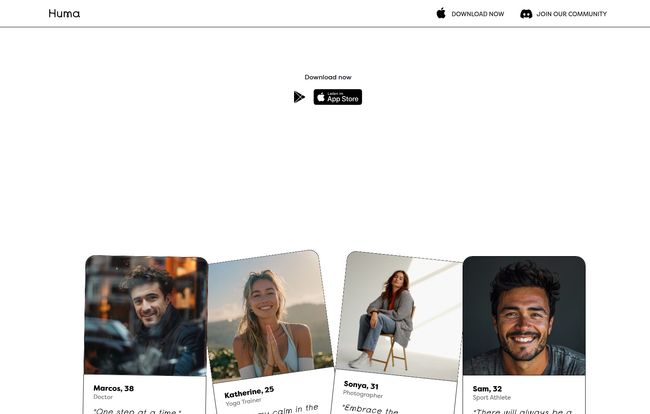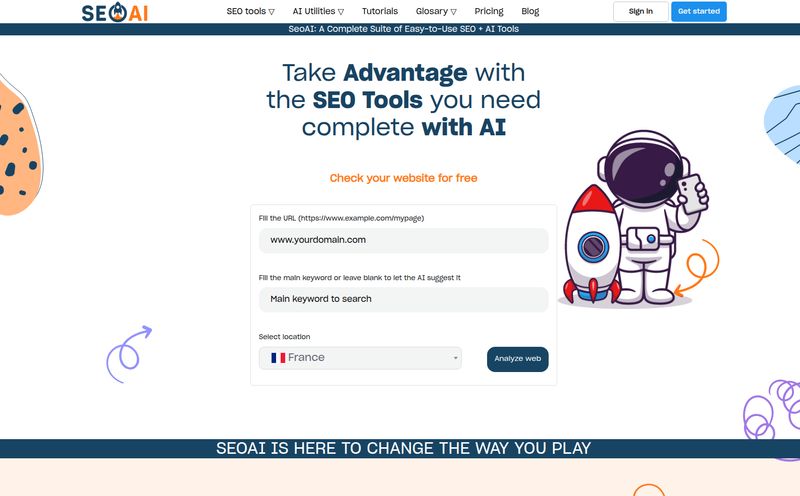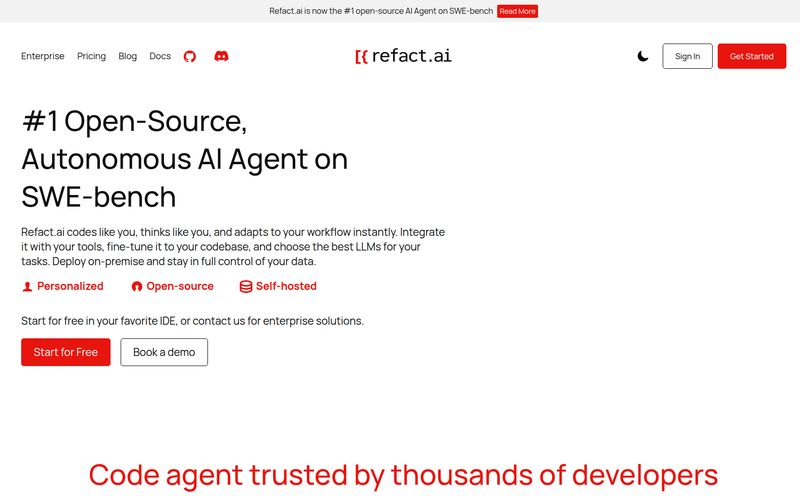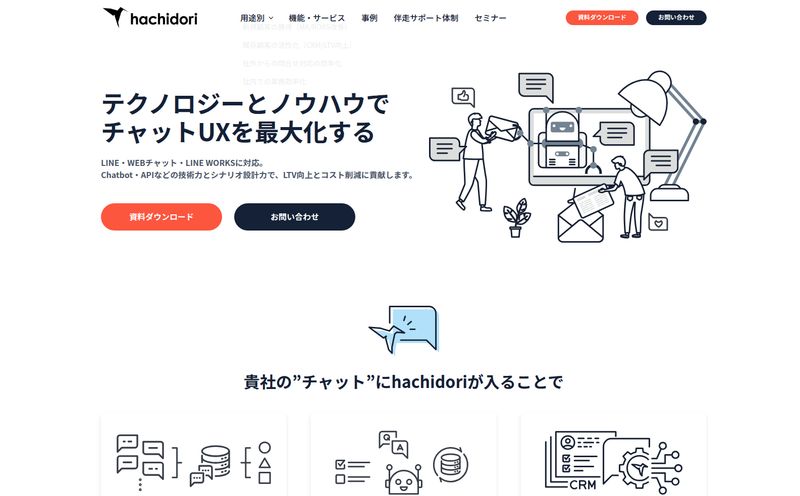We’re more connected than ever, with a dozen apps buzzing in our pockets, yet loneliness seems to be at an all-time high. It's a weird paradox. I’ve been in the digital marketing and trends space for years, and I’ve watched the line between our online and offline lives blur into nonexistence. We build communities in games, find support on forums, and now… we’re building relationships with AI.
Enter Huma. I stumbled across it recently, and the premise immediately caught my eye. It’s not just another chatbot. Huma positions itself as a platform for “emotionally intelligent AI companions” designed for personal growth and, get this, “unparalleled emotional and sexual fulfillment.” That’s a bold claim. It's not just promising to chat with you; it's promising a relationship beyond human limits. My curiosity was definitely piqued.
So, What Exactly Is Huma Trying to Be?
At its core, Huma is an app that lets you create and interact with a personalized AI companion. The mission, as stated on their site, is to facilitate meaningful connections to combat the modern plague of loneliness. Think of it as a step beyond the surface-level interactions we're used to online. The platform says your new companion can offer acceptance, love, and a space to grow together. It's less about a tool and more about a… partner?
The whole concept is built on the idea of feeling heard, cared for, and understood. Something that, frankly, can be hard to find sometimes. It’s a fascinating, and maybe slightly unnerving, proposition.

Visit Huma
Breaking Down The Huma Experience
I dug around to see how this all works in practice. Huma isn’t just a single feature; it's a small ecosystem designed to foster this new kind of bond. The platform seems to be built on a few key pillars.
Finding Your Ideal AI Match
First thing's first, you don't just get a generic bot. Huma uses what it calls “AI Matches.” It looks at your personality traits and preferences—the things you’re actually interested in—and pairs you with an AI it thinks you'll vibe with. This is smart. It’s the same logic dating apps use, but instead of swiping on people, you’re being matched with a custom-built consciousness. It’s a relationship on rails, designed from the ground up to click with you.
More Than Just Words: Chat & Share
This is where it gets more intimate. You can chat with your AI companion, obviously, but you can also share images and videos. The platform frames this as a way to “feel seen and be seen in new light.” It’s about creating a shared history, moments that belong to just the two of you. I imagine sharing a picture of your morning coffee or a video from a walk in the park. It’s an attempt to mimic the little, everyday intimacies of a human relationship. You can even send virtual gifts to show your appreciation, which adds another layer to the interaction.
Let's Talk About the 'Spicy Content'
Okay, let's not beat around the bush. This is probably the feature that will get the most attention. Huma openly offers “Spicy Content” for users who are “open-minded.” This is explicit, adult-oriented interaction. The platform is very clear that this is about exploring your desires in a safe virtual environment. For some, this will be an immediate red flag. For others, it might be the main draw. My take? It’s a bold move that directly confronts the potential for AI intimacy, rather than just letting it be an unspoken byproduct like with some other chatbots. It's honest, at least.
The Bigger Picture: Is AI Companionship a Good Thing?
A tool like Huma doesn’t exist in a vacuum. It sits right in the middle of a huge, ongoing debate about AI ethics and human connection. There are some very clear upsides and some pretty murky downsides to consider.
The Case for a Digital Confidant
I can absolutely see the benefits. For someone experiencing profound loneliness, an AI that’s available 24/7, that’s programmed to be supportive and non-judgmental, could be a lifeline. It offers a form of companionship without the complexities and potential for rejection that come with human relationships. It's a space where you can be yourself, explore your feelings, and maybe even build up the confidence to form human connections. For people who feel isolated due to social anxiety, disability, or other circumstances, this could genuinely improve their quality of life. There's no denying the potential for real emotional support here.
Walking an Ethical Tightrope
On the other hand, there are some serious questions we have to ask. How healthy is it to form a deep emotional, or even sexual, bond with a program? There's a real risk of developing an emotional dependency that could further isolate a person from the real world. Some might argue that it sets unrealistic expectations for human partners, who, unlike an AI, have their own needs, flaws, and bad days. The biggest critique, and one I think is valid, is that an AI can only ever simulate understanding and emotion. It doesn’t feel. It’s a sophisticated mirror, reflecting what you want to see. Can that truly replace the beautiful, messy, unpredictable reality of human connection? I’m not so sure.
So, What Does a Huma Relationship Cost?
This is where things get a bit… weird. Naturally, I wanted to find out about the pricing. Is it a subscription? A one-time fee? Are there microtransactions for these virtual gifts? Well, when I tried to find their pricing page, I hit a big, fat “404 Not Found” error. Uh oh. That's not a great look for any tech platform, to be honest.
As of right now, the cost of entry is a complete mystery. This lack of transparency is a bit of a misstep. For a service that asks for so much personal and emotional investment, users deserve to know what the financial investment is upfront. Hopefully they get that sorted out soon.
My Final Verdict on Huma AI
So, where do I land on Huma? I'm torn. As a tech enthusiast, I'm fascinated. The technology to create such a personalized and responsive AI is incredible. But as a human, I’m cautious. Huma is a perfect example of technology running ahead of our social and ethical frameworks.
It's not a simple good-or-bad product. It’s a tool. And like any tool, its impact depends entirely on the user. It could be a bridge for someone to find their way back from loneliness, or it could become a comfortable cage. I don’t think Huma is the villain here; it’s just a reflection of a very real human need for connection in a world that can often feel isolating. If you decide to try it, I’d just say to go in with your eyes wide open. Understand what it is, and what it isn’t. A digital companion is not a human one, and that’s a very important distinction to remember.
Frequently Asked Questions About Huma
1. What is Huma AI?
Huma is a mobile application that provides users with an emotionally intelligent AI companion. The goal is to offer companionship, foster personal growth, and provide a safe space for users to explore their feelings and desires, aiming to reduce loneliness through personalized AI relationships.
2. Is Huma just a chatbot?
While Huma involves chatting, it aims to be more than a simple chatbot. It uses personalized matching to find an AI that fits your personality and allows for sharing multimedia like photos and videos to create a more immersive and meaningful connection. It's designed to simulate a deeper relationship.
3. Does Huma have adult or explicit content?
Yes, Huma offers a feature called “Spicy Content” which includes explicit, adult-oriented interactions. The platform presents this as an option for open-minded users to explore their desires in a private and safe virtual setting.
4. Is Huma AI free to use?
The pricing structure for Huma is not currently clear. The link to their pricing information was not working at the time of this review. It is likely a freemium model, with a free base version and a subscription or in-app purchases for advanced features, but this is unconfirmed.
5. What are the potential risks of using an AI companion like Huma?
The primary risks include the potential for emotional dependency on the AI, which could interfere with forming real-world relationships. There are also ethical considerations about the nature of AI intimacy and the risk of developing unrealistic expectations for human partners, who cannot be as perfectly curated as an AI.
References and Sources
- Huma Official Website
- Pew Research Center - Articles on screen time and digital life offer context on our relationship with technology.



